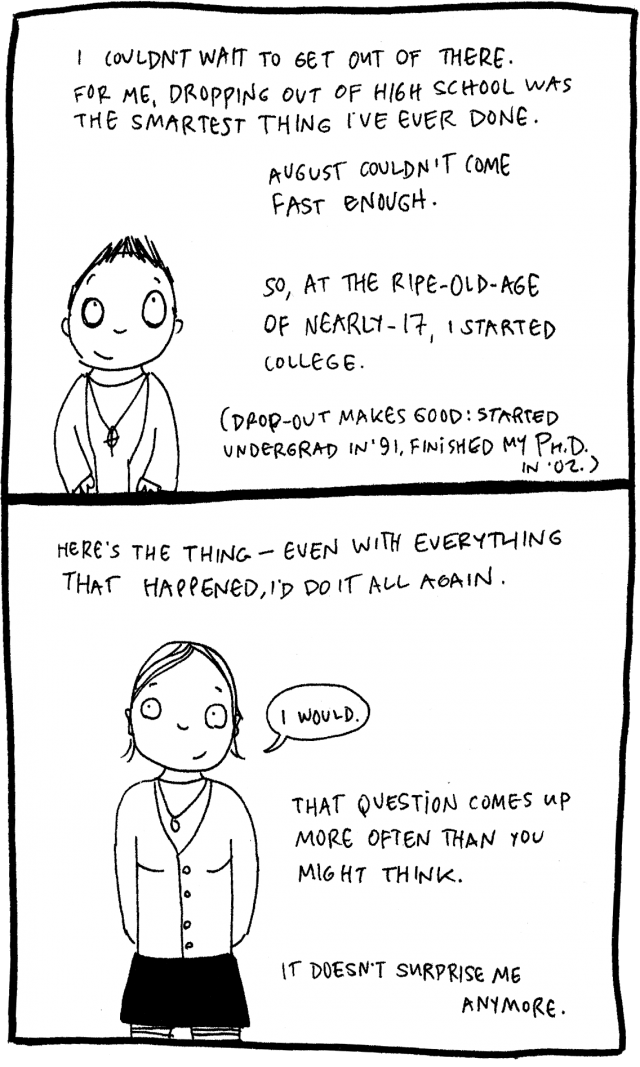
Hairstyles Anne has known.
The first thing you’re likely to notice about Anne Thalheimer’s What You Don’t Get is that it doesn’t have any narrative structure to speak of. It’s a memoir utterly unmoored from the vector of time, jumping without warning between 25 years of unconnected moments and the present day, following all manner of tangents to an increasingly broad array of seemingly inessential information. Every time the narrator’s hairstyle (rendered with a few pen strokes) changes, we know we’ve again leaped in space and time, but unless we’re maintaining a chart correlating ’dos to the life stages that inspired (necessitated?) them, it’s hard to keep track of just where we are. The author even includes a timeline at the end, conceding her “book isn’t exactly the most linear thing.”
You may well be a savvier reader than I, who was solidly 50 pages into this 133-page illustrated memoir before I realized just how meticulously executed this narrative tortuousness was. But by the time I could see the arc I was tracing, it had already wreaked its intended havoc on my delicate little heart. Beneath the zine-y aesthetic and doodle-y presentation there’s a structure, to be sure, serving its emotional purpose, doing what structure is meant to do. But if this structure has a name, I don’t know it.
Let’s try this: you’re miniature golfing with your friends. And because, unlike this reviewer, you were not raised on the Jersey shore, this isn’t your first choice of activities. It’s a warm summer night on which you’re happy to be out in good company, but your heart isn’t totally in the game. You swing in the vague direction of the hole, but your ball sails by, a foot and a half to the side, ricocheting off the base of a creepy plaster giraffe or maybe a dinosaur foot or something else equally irrelevant to the game it decorates. You pad after your ball and try again, humbled into making an effort, but still miss by a few inches. Surprised at how difficult this absurd enterprise is proving, you steady your stance, square your shoulders, and direct the ball toward the hole; its path is bent by the circumference of the target, and yet it does not go in, coming to rest on the green centimeters away. Rolling your eyes, and suddenly intent on completing the task before you, you give the ball a short sharp shot into the hole, from which it immediately bounces back out. Oh for fuck’s sake, you think, grabbing the ball and dropping it into the can. But the quiet rumble you hear informs you that this was only the first half of a multi-tiered hole, and the real target is on the terrace below you, where your ball has reappeared.
That, I submit, is the structure of this book; an exasperating hole of miniature golf. “Here’s the thing,” Thalheimer interrupts herself, echoing for the first of many times the conversational summation implied by her title. “Even with everything that happened, I’d do it all again.” We know we are approaching an unpleasant event in the author’s college years, an event which, two pages later, we have shot well past:
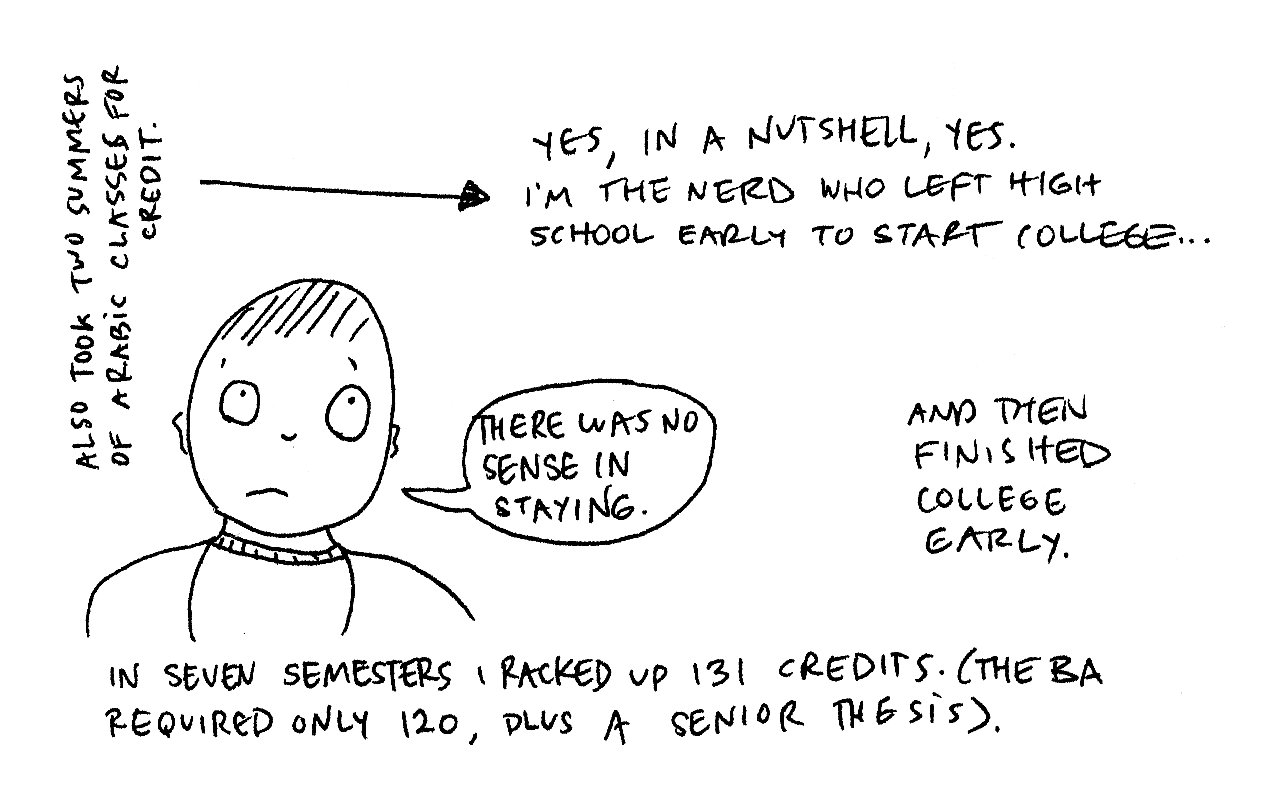
Oh look, a plaster giraffe.
Turn the page and we’re back to first semester, navigating roommates and course schedules and campus theater productions, professing love in chicken costumes because college, with the event in question once more ahead of us. And every time we think we’re within inches of it…
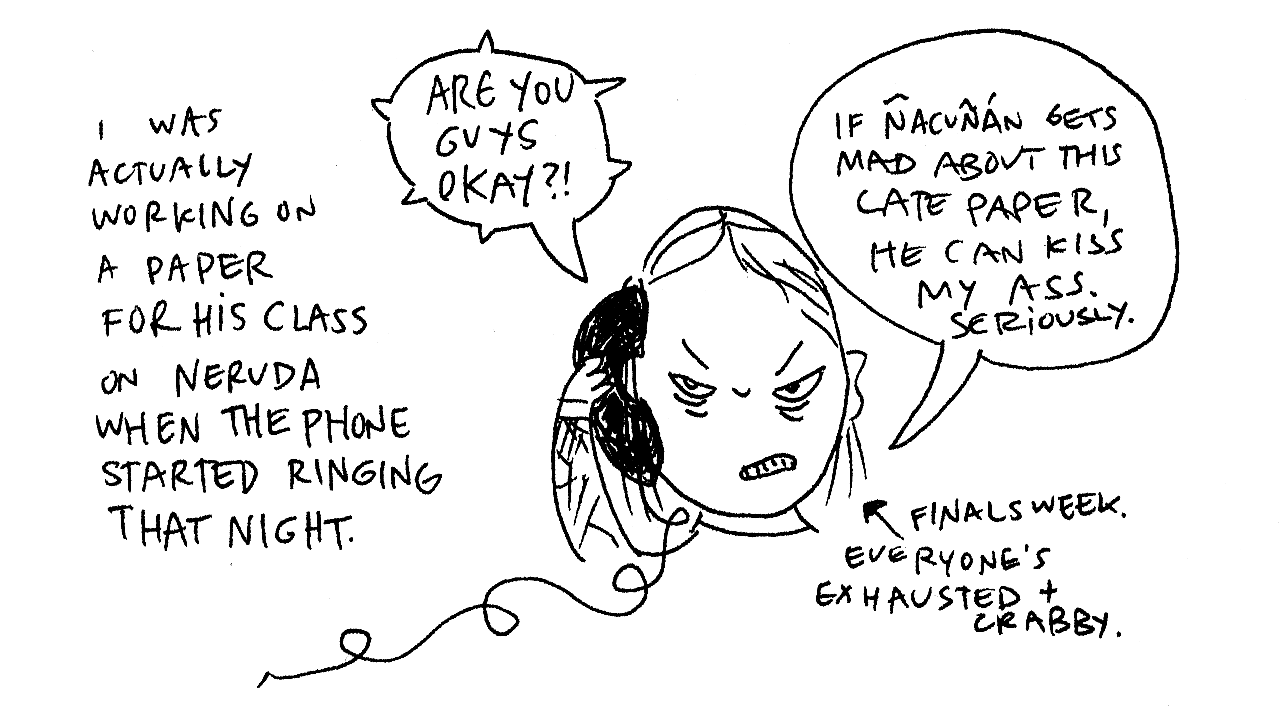
Okay, you ready?
…we’re not:

Too bad.
This is going to happen a lot over the first half of the book. We are going to spend so much time circling the subject, in fact, so much time obsessing over the minutiae of collegiate existence when we know something important is happening somewhere else, that we can be forgiven for starting to feel a bit like college students ourselves.
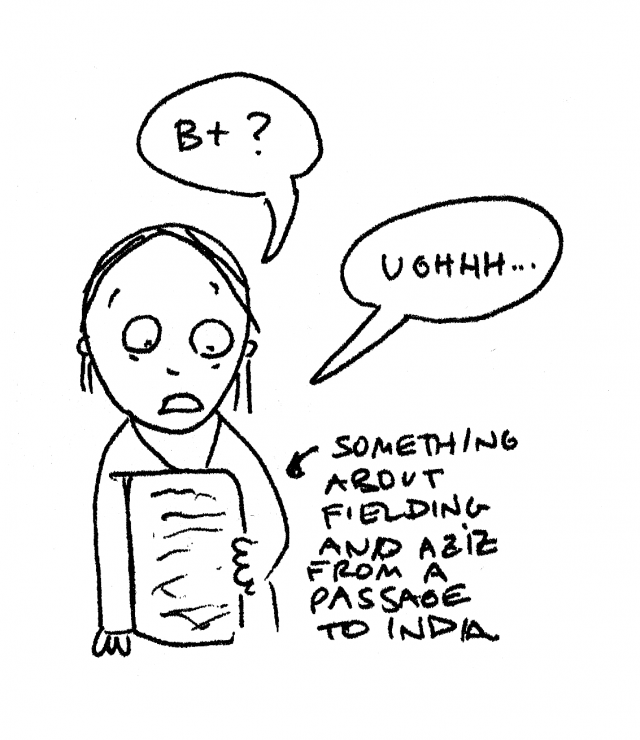
Remember rolling your eyes at these people? Prepare yourself for an uncomfortable level of sympathy.
We worry about finishing all the coursework with which we’ve foolishly burdened ourselves, we obsess over where this clearly ill-advised relationship is headed. Even I, no fan of college kids even when I was one, and never the sort of student who could complain about a B, found myself relating to the narrator’s travails.
Returned, as we are, to this larval state, we are particularly ill-equipped for the trauma ahead. When it comes and finds us utterly unprepared, fretting over our GPA’s like self-involved children, perhaps we understand a little bit better how it felt for the narrator. “I was in hell,” she says of her sleepless nights spent finishing papers. “Or I thought I was, anyway.”
And so a new way of modeling this narrative arc begins to present itself: This is a book that follows the form of a reluctant conversation. A conversation your conversant simultaneously wants and does not wish to have. You are trying to be both available and undemanding while she attempts to figure out how to say what she has to say. But she is really taking her time.
Words, for example, are often crossed out and replaced with other words. The same words, over and over, so we know this isn’t lazy editing, or the artist running out of white-out; this is the way we post-collegiate progressive types talk, replacing on the fly the language we’ve been taught with the language we’re trying to teach ourselves. And we see that using one word rather than the other is deliberate, and difficult, and important to the the writer.
Names are written and redacted like a visual “forget I said that.” Dates and places are misremembered and corrected or left uncertain, possibilities listed with question marks after each. Pretty soon, we see why these uncertainties haven’t been cleared up:

…which seems also to confirm our suspicions about the narrator’s ambivalence. Because if this all happened twenty years ago, why are we just hearing about it now? Why didn’t Thalheimer record these events before what memories there were faded?
It’s not like she hasn’t tried. Throughout the book, we see snippets of difficult and aborted conversations. The incident is national news, and then a matter of historical record, and people have questions. They’re questions which, as readers, we’re likely to share, built up by the narrative’s persistent evasiveness, and we find ourselves uncomfortably aligned with the inquisitors causing the author to cry or fume or vomit.
They’re questions which, despite the difficulty, Anne initially tries to answer. But the chasm of comprehension between someone intimately affected by this public tragedy and those of us who’ve simply heard about it proves too vast. “I start to realize that nobody’s gonna get it,” she tells us, “Not Really. And I stop telling people and I stop talking about it because I am wary of being seen as a victim.”
This concern is oft-repeated. Anne doesn’t like being a victim in her friends’ eyes any more than she likes the word itself: “It’s too passive. This thing happened to you. (Which is true enough, I Guess. But I’m also living with it.)”
We’ve all learned to replace the word “victim” with “survivor” in these discussions, an alternative we vaguely understand to be more “empowering.” For Thalheimer, this isn’t a matter of semantic propriety but a material difference of meaning. The latter is a process, rather than a state of being. It’s active. It’s work. A “victim” is just something to be; “survivor” describes what you do.
And continue to do, day in, day out, for twenty years, and all the years after. We learn of the coping mechanisms Anne still employs, how she hides out in small dark spaces like closets and office bathrooms, how some days she never leaves her bed. We see diary pages on which Thalheimer struggles, à la Spiegelman, with writing the book we are now holding, dated years before its publication. We learn it took ten years to complete.
And we start to realize that the various asides are not diversions but part of this process, part of the work of survival, the work of continuing to exist despite the difficulty and impulses to the contrary, and the book that contains them is the product of that work.
Further, the seemingly inconsequential details and assorted autobiographical tidbits are what we as readers need to be the most understanding, sympathetic possible humans when the information for which we’re waiting finally comes. Suddenly, everything parenthetical becomes primary. Thalheimer is trying to bridge the gap of understanding, to explain to us what we don’t get.
Well. For me, there was a lot of that. But the biggest understanding gained was this: the tragedies you hear about on the news happen to actual people. People who were in the midst of other pursuits, who already had problems to solve and challenges to face and prior traumas to manage. People who are, like all people, still in their formative years, for whom these experiences inform the shape they will henceforth take. For Anne, this was not an event she experienced in the past; it’s part of her, happening now in an eternal literary present, coloring her experience of everything else.
“I think it’s like this for everyone,” she proposes, “I think it’s perpetual.” Because what you don’t get, Anne finally accepts, is “over it.” But if you’re lucky, and you try, and you survive, actively, day after day, maybe you can get on with it.
 Festival Season
Festival Season 

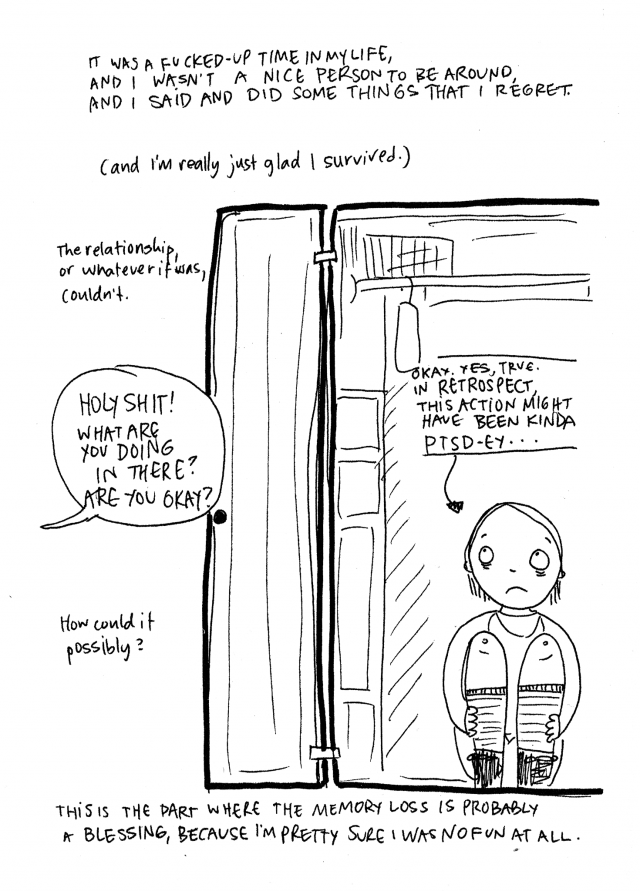



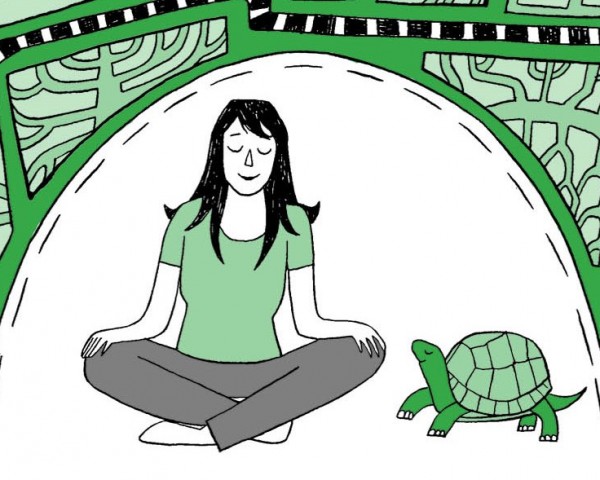


What an incredibly perceptive and insightful review… I am a friend of Anne’s and I went to SRC at the same time and she captures so much of the uncapturable essence of that experience, I cannot recommend this book enough.